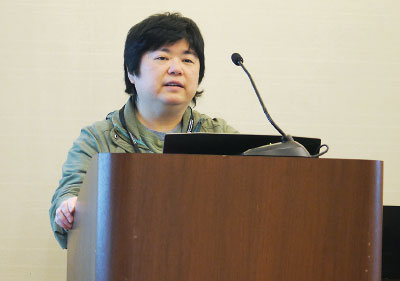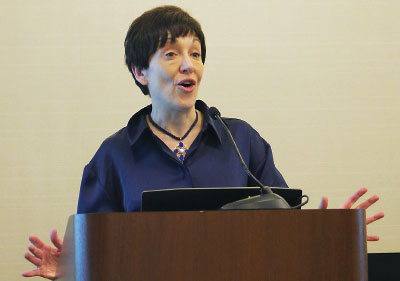Obstructive Sleep Apnea, Psychotic Symptoms Common in Alzheimer’s Disease Patients
Abstract
Mention Alzheimer’s disease, and often enough, the first thing to come to mind is memory impairment. But the symptoms of Alzheimer’s disease go beyond that.
Obstructive sleep apnea and psychosis are among the symptoms of Alzheimer’s disease that go beyond memory impairment, said experts at the American Association for Geriatric Psychiatry 2023 Annual Meeting in New Orleans.

Older patients should be screened for obstructive sleep apnea and other sleep disorders because most sleep disorders can be treated, said Winnie Pao, M.D.
“Patients with Alzheimer’s disease are five times more likely to have obstructive sleep apnea, and about half of patients with Alzheimer’s experienced obstructive sleep apnea at some time after their initial diagnosis,” said Winnie Pao, M.D. She is a neurologist and sleep medicine specialist at the Cleveland Clinic.
Pao explained that obstructive sleep apnea, a sleep disorder characterized by frequent breathing cessation and/or reduction of airflow due to partial or complete obstruction of the upper respiratory airway, causes several conditions that can damage the heart and brain and contribute to cognitive decline and Alzheimer’s disease. These conditions are hypoxia (low blood oxygen), frequent awakenings, and sleep fragmentation. Obstructive sleep apnea also causes inflammation and endothelial dysfunction that reduce the elasticity of blood vessels and increase clotting and coagulation, which predispose people to atherosclerosis, another condition associated with a higher risk of cognitive decline and Alzheimer’s disease, Pao explained.
“Cognitive complaints in patients with obstructive sleep apnea can include decreased attention, poorer executive function, and memory deficits, and these patients are more likely to have anxiety, stress, and depression,” Pao added.
Pao noted that research about the potential benefits of continuous positive airway pressure (CPAP) therapy and cognition in adults with obstructive sleep apnea has yielded mixed results. Some studies suggest that CPAP therapy can improve cognitive function in adults with obstructive sleep apnea. Another study showed a 35% lower risk of an Alzheimer’s disease diagnosis in patients who were treated with positive airway pressure (PAP) therapy compared with those who were not treated with PAP.
Other studies did not show a cognitive benefit from CPAP or PAP therapy, but Pao noted the limitations of the research. For example in one study, the patients used their CPAP machines only about 3.5 hours a night.
“If most people sleep seven or eight hours a night, only [using CPAP] for a few hours is like someone with hypertension saying ‘Hey, can you treat my blood pressure for 12 hours a day and leave it untreated the other 12 hours?’ That’s just not the way to do it. The duration of treatment is very important,” Pao said.
Pao said that older patients should be screened for sleep disorders.
“Older people don’t complain about sleep disturbances compared with their younger counterparts, so we have to ask them about their sleep and figure things out. We need to do that because most sleep disorders are treatable,” Pao said. “If they screen positive [for obstructive sleep apnea], I will tell them, ‘Congratulations, you have sleep apnea. We can do something about that.’ ”

Medications that work for other types of psychosis may not work as well in Alzheimer’s disease because they work on circuitries that may already be degenerated by Alzheimer’s, said Kasia Gustaw Rothenberg, M.D., Ph.D.
Kasia Gustaw Rothenberg, M.D., Ph.D., a geriatric psychiatrist at the Cleveland Clinic, spoke about psychotic syndromes in Alzheimer’s disease.
“Between 60% and 98% of patients with Alzheimer’s disease will have at least one disruptive neurobehavioral symptom over the course of the disease, and 30% have psychotic symptoms, including 30% to 40% who have delusions and 15% to 30% who have hallucinations,” Rothenberg explained. She added that the management of disruptive neuropsychiatric symptoms accounts for 30% of the cost of caring for patients with Alzheimer’s disease.
Rothenberg discussed several studies that differentiate the types of psychosis and neuropsychiatric symptoms that are prevalent in various forms of dementia.
“Hallucinations are the archetype of Lewy body disease psychosis whereas delusions are the archetype of Alzheimer’s disease,” she said. She explained that the delusions typical of Alzheimer’s disease are the following:
Capgras type (the feeling that someone known to the patient is replaced by an impostor).
Phantom boarder syndrome (the feeling that strangers are living in the patient’s house).
Mirror sign (patient misidentification of his or her own image in a mirror).
TV sign (television images misidentified as real).
“Loss of volume in parahippocampal gyri, and subsequently impaired ability to correctly attribute context to visual information, may lead to formation of misidentification delusions,” Rothenberg said.
Rothenberg said that treating psychotic symptoms in Alzheimer’s disease can be challenging.
“We do not really have anything that is approved for neuropsychiatric symptoms except for the treatment of psychosis in Parkinson’s disease, but pharmacological intervention that would help in other kinds of psychosis [such as psychosis associated with schizophrenia, bipolar disorder, and Parkinson’s disease] may not work as well in Alzheimer’s disease because the circuitries these [medications] work on may be degenerated.” ■



